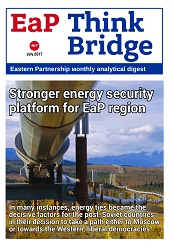EAP Think Bridge - № 2017-07 - Stronger energy security platform for EAP region: current situation analysis and recommendations
EAP Think Bridge - № 2017-07 - Stronger energy security platform for EAP region: current situation analysis and recommendations
Author(s): Daniel Marin, Danu Marin, Vugar Bayramov, Arseniy Sivitsky, Yurii Vdovenko, Ahmad Alili, Richard Giragosian, Olga Chyzhova
Subject(s): Regional Geography, Governance, International relations/trade, Present Times (2010 - today), Peace and Conflict Studies
Published by: PIC Promotion of the Intercultural Cooperation
Summary/Abstract: Energy is a much broader issue for the EAP countries than economy or even security. In fact, this is an issue of the state independence, and the leverage Moscow has a habit of using to put pressure on those aspiring to escape its control. The Russian energy products were many times a decisive factor for choosing of a certain geopolitical way, and the perspective to be left without the Russian supplies overturned the ambitions of the European integration for the countries of the region. Will the Eastern Partnership be able to create a common energy platform and deprive Kremlin of one of its best cards? What are the preconditions for such cooperation and what stands in its way? The answers you will find in the analysis by Azerbaijani expert Ahmad Alili. While in June Georgia faced Russia interfering with its foreign policy yet again. Concerns have been raised by the Russian diplomats regarding the prospects of the Tbilisi’s deeper cooperation with NATO. At the same time this month clear aspirations of a NATO membership were juridically confirmed by Ukraine as a law. Belarus is moving towards visa facilitation with the EU. However, these functions have for some reason been performed not by the Belarusian diplomats but by the Ministry of Internal Affairs, following the general trend of strengthening the positions of the law enforcement officials in the country. Moldova is still torn between the West and the East: while its prime min¬ister visited Brussels, its president had one more official visit to Russia. As for Armenia and Azerbaijan, both countries expressed criticism ad¬dressed to their Western partners. Yerevan, despite the financial aid com¬ing from the EU, responded strongly to the comments regarding its Central Electoral Commission, while Baku announced that an attempt of the OSCE Minsk group to facilitate the resolution of Nagorno Karabakh conflict failed. You can find the main trends of the first half of the summer in each of the six countries in our traditional monthly reviews. //// CONTENT: ARMENIA: POLITICAL POSTURING & ECONOMIC OPTIMISM // AZERBAIJAN: NEW CHALLENGES OF OIL PRICES INSTABILITY // BELARUS: POLITICAL GAMES OF LAW ENFORCEMENT AGENCIES // GEORGIA: SEVEN YEARS WAITING FOR DEMOCRACY // MOLDOVA: MIXED ELECTORAL SAGA CONTINUES // UKRAINE: FOCUS ON FOREIGN POLICY // ANALYTICA: STRONGER ENERGY SECURITY PLATFORM FOR EAP REGION: CURRENT SITUATION ANALYSIS AND RECOMMENDATIONS // EAP THINK BRIDGE ROUND TABLE: BRIDGING THE DIVIDE: FORGING COOPERATION & FOSTERING COLLABORATION
Series: EAP Think Bridge. Eastern Partnership monthly analytical Digest
- Page Count: 22
- Publication Year: 2017
- Language: English
- Content File-PDF

